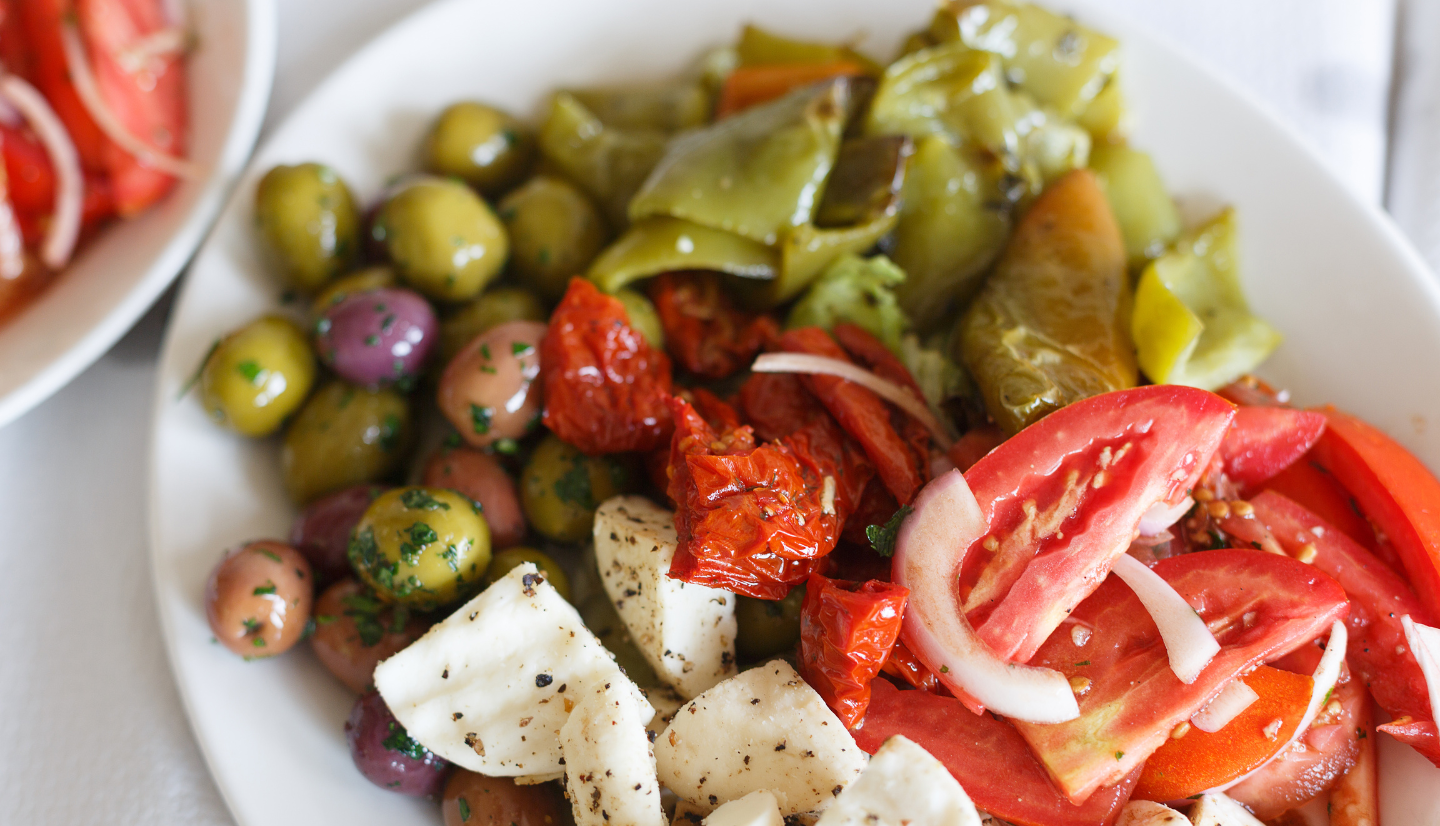
Delicious, heart-healthy, and affordable – perfect for every age
The Mediterranean Diet first gained attention in the 1970s with Dr. Ancel Keys’ Seven Countries Study, which found that populations near the Mediterranean Sea had some of the lowest rates of coronary heart disease. This traditional way of eating emphasizes plant-based foods, healthy fats like extra virgin olive oil, and minimal red meat or processed foods.
Appropriate for all ages, the Mediterranean Diet encourages sustainable habits that are delicious, simple, and proven to support lifelong health.
Here’s a closer look at the core components of this heart-healthy, flavorful approach:
Grains like bulgur, quinoa, couscous, farro, barley, and brown rice are fiber-rich and loaded with vitamins and minerals that refined grains lack. Choose whole grain bread, brown rice, and pasta for long-lasting energy and digestive support.
A wide variety of seasonal, local and colorful produce is low in calories and packed with antioxidants, fiber & nutrients. Higher fruit and vegetable consumption is linked to a reduced risk of chronic diseases.
These are the main plant-based proteins in the Mediterranean Diet. Lentils, beans, almonds, and sunflower seeds offer minerals, fiber, and healthy fats. Studies link them to a lower risk of heart disease, type 2 diabetes, obesity, and some cancers.
Olive oil replaces butter and processed oils as the main source of fat, offering monounsaturated fatty acids (MUFAs) that help raise HDL (“good”) cholesterol and reduce inflammation. Olive oil possesses antioxidant and anti-clotting properties.
Seafood, poultry, and eggs are preferred over red meats. Fatty fish like salmon, tuna, and sardines are also excellent sources of omega-3 fatty acids that reduce the risk of heart attack and stroke.
Natural options like feta, Parmesan, and Greek yogurt offer calcium and protein with less processing. Stick to a few servings per week and avoid sugary, high-fat varieties.
Some studies suggest that moderate red wine consumption with meals may have heart benefits. However, it’s not without risk – particularly for young adults. One in four deaths among Americans aged 20 to 34 involves alcohol. Know your limits and weigh the pros and cons.
Pairing the Mediterranean Diet with 30 minutes of movement most days of the week helps improve heart health, manage weight, and reduce stress. Walking, gardening, or light stretching all count.
Aim to drink half your body weight in ounces of water daily. For a 140-pound person, that’s about 70 ounces. Water supports every system in your body and helps prevent overeating.
Mediterranean Diet cooking features bold herbs and spices – like basil, oregano, rosemary, and thyme – for flavor and color, not sodium.
Multiple U.S. and European studies show that consistent adherence to the Mediterranean Diet is associated with a reduced risk of:
• Cancer
• Cardiovascular disease
• Metabolic syndrome
• Alzheimer’s disease
• Parkinson’s disease
This isn’t a quick-fix diet – it’s a lifelong lifestyle that promotes overall well-being and longevity.
Eating Mediterranean Diet style doesn’t require exotic shopping trips. Farmers markets and grocery stores, especially from April – October, are stocked with seasonal options.
Try these simple swaps:
• Choose more fruits and vegetables than other items
• Pick whole grain pasta and bread (check for “whole wheat” as the first ingredient)
• Choose extra virgin olive oil over butter or margarine
• Buy frozen or canned fruits and veggies when fresh options are too pricey
You don’t have to overspend to follow the Mediterranean Diet. Try these cost-saving ideas:
• Greek yogurt is high in protein but may cost more.
Regular, low-fat, low-sugar yogurt is a good alternative.
• Canned fish like tuna and salmon are budget-friendly
sources of omega-3s.
• Meat alternatives such as eggs, beans, and nuts are
protein-rich and often cheaper than meat.
• Seasonal produce is typically fresher, more affordable,
and more nutritious. Frozen or canned veggies are also
smart options with longer shelf lives.
Other evidence-based diets, such as the DASH Diet, USDA’s MyPlate, and the American Heart Association’s lifestyle guidelines, share many of the same benefits. What makes the Mediterranean Diet distinct is its focus on:
• Olive oil and olives
• Wine in moderation
• Fresh herbs and spices instead of salt
Healthy eating is only one piece of the puzzle. A truly balanced lifestyle includes regular movement, restorative sleep, social connections, and stress management.
For families looking to nourish their bodies and simplify their meals, the Mediterranean Diet offers a delicious, flexible, and science-backed approach to living well – starting with what’s on your plate.
Food & Nutrition